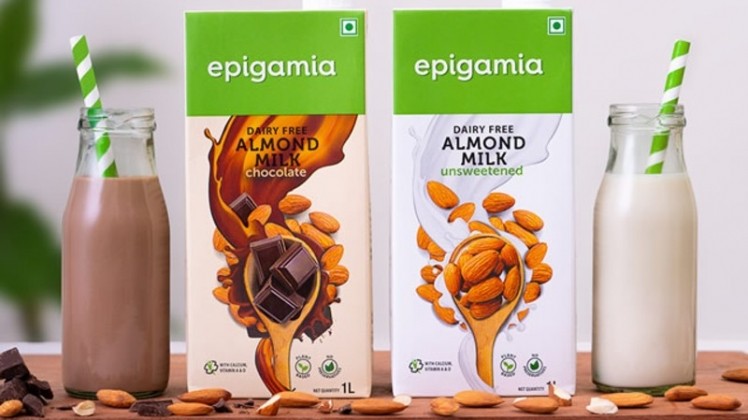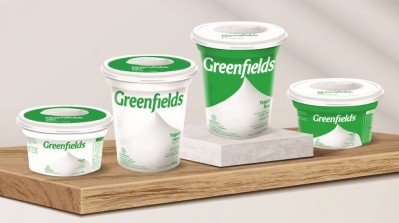Almond attraction: Epigamia CEO on how Indian consumers helped lead the charge for plant-based milk NPD

According to Epigamia CEO Rohan Mirchandani, almond milk has gained widespread appeal amongst Indian consumers, which drove the firm to work on launching its first almond milk products to cater to rising demand.
“Almond milk fits the [local Indian] taste profile and is more suitable for application purposes, be it with breakfast cereal or a healthy smoothie with fruits, or even a hot or cold coffee,” Mirchandani told FoodNavigator-Asia.
“In contrast, [although we have worked with coconut milk for other products such as our coconut yoghurt, in terms of such applications] coconut milk is actually mostly used for cooking purposes [in India].”
Almond milk also topped the list for innovation as a result of a consumer survey Epigamia did with its audience, prompting this to be prioritised over soy or cashew or oat or any other type of plant-based milk.
“[The survey also helped us to figure out what flavours our consumers were really after – by the end of it], chocolate and the unsweetened versions of almond milk emerged as clear winners, and thus we decided to launch these two variants first,” he said.
“[Health and wellness appear to still take a front seat here as we found that] most of our Plant-Based consumers do not want sugar in their almond milk – [so] thus far we did not look at the regular sweetened version first.”
In line with this, Epigamia’s almond milk also caters to the health conscious crowd by emphasising zero preservatives, no added sugar and a nutrient-rich profile with 225mg calcium, 3.4g protein, 120mcg Vitamin A and 3.5mcg Vitamin D per 200ml of either flavour.
“Our recipe also has some additional processed changes that make it suitable for the Indian palette,” said Mirchandani, though he remained coy on the details of this.
The firm aims to deliver its almond milk products all over the country using its self-developed cold chain system, which it is already utilising to send its traditional dairy and coconut yoghurts nationwide.
“There aren’t any major differences between transporting traditional or plant-based dairy products across long distances - fundamentals remain pretty much the same,” Mirchandani told us
“We’ve had reasonable success developing our own cold chain system and distribution model in India, [and now] intend to use this same distribution model to ship almond milk ship all across the country.”
Epigamia’s almond milk currently retails at INR300 (US$4.11) per one-litre pack, and can be found across Modern trade (supermarkets and hypermarkets), General trade (mom-and-pop shops), Alternate channels (hotels, schools, etc.) and E-commerce (bigger platforms such as Big Basket and Amazon) – the latter of which the firm has been placing more focus on ever since COVID-19 hit.
Challenges
Epigamia’s determination to press forth with the broadening of its plant-based portfolio amidst times of major uncertainty is bold – debates over regulations governing the use of traditional dairy terms such as ‘cheese’ or ‘milk’ for plant-based products are still ongoing, with the plant-based industry on one side and the Food Safety and Standards Authority India (FSSAI) as well as the traditional dairy industry at loggerheads over the matter.
Mirchandani believes that plant-based products such as almond milk and peanut butter have ‘successfully established their identity in the mind of consumers’ so there is no need for additional governance, but has repeatedly stressed that Epigamia is not ‘taking sides’ and that both traditional and plant-based dairy should be able to ‘peacefully coexist’.
“[We believe that there can be] massive coexistence between both sides, traditional and plant-based dairy - but the challenge we have is that either side takes it on as something different,” he told us previously.
“We’ve had traditional dairy speak out against us as we’re ‘the plant-based guys’, then we’ve also had the plant-based activists speak out against us because they think we’re still the dairy guys.
“We are not an activist brand – we believe it’s our job to deliver nutritious, healthy options and let consumers decide what they feel is the right way to go about it, but not force any sorts of products down their throats either way.”i
The other challenge Epigamia – and plant-based dairy in general – faces in India is product pricing. In India, one litre of branded milk, e.g. Amul milk can go for some INR61 (US$0.84), about five times cheaper than their almond milk, and also cheaper than soya milk e.g. Sofit at around INR111 (US$1.52) which is usually cheaper in most Asian countries.
That said, Mirchandani believes that there is definitely a place for Epigamia’s almond milk especially amongst the younger, more sustainability-conscious crowd, and already has plans to launch more plant-based beverages using coconut milk as an ingredient.
“We’re working on a few surprising variants of coconut milk-based beverages, and have also been working hard in the dairy arena to launch our probiotic yoghurt and our own version of paneer (Indian cottage cheese) – so many exciting things [in the pipeline],” he said.


















